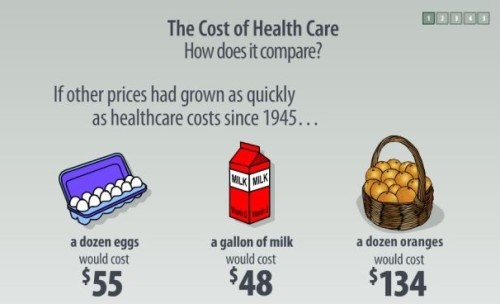

According to the influential Institute of Medicine, (AP) — The U.S. health care system squanders $750 billion a year — roughly 30 cents of every medical dollar — through unneeded care, byzantine paperwork, fraud and other waste, the influential Institute of Medicine said Thursday in a report that ties directly into the presidential campaign. (As printed on the BenefitsPro website today) in an article posted by Ricardo Alonso-Zaldivar , in an article titled, “Waste Not, Heal Not.”

The ‘nuclear option’ of $750 billion dollars does little to itemize and correctly identify needless spending. It lumps it all in one bucket, private medicine, institutional medicine, government medicine (military and/or Veterans Hospitals and outpatient (ambulatory) or in patient health care.
President Barack Obama and Republican Mitt Romney are accusing each other of trying to slash Medicare and put seniors at risk. But the counter-intuitive finding from the report is that deep cuts are possible without rationing, and a leaner system may even produce better quality.
Here are some of the quotable from the article:
“Health care in America presents a fundamental paradox, ……
“The past 50 years have seen an explosion in biomedical knowledge, dramatic innovation in therapies and surgical procedures, and management of conditions that previously were fatal …
“Yet, American health care is falling short on basic dimensions of quality, outcomes, costs and equity,” the report concluded.
If banking worked like health care, ATM transactions would take days, the report said. If home building were like health care, carpenters, electricians and plumbers would work from different blueprints and hardly talk to each other. If shopping were like health care, prices would not be posted and could vary widely within the same store, depending on who was paying.
If airline travel were like health care, individual pilots would be free to design their own preflight safety checks — or not perform one at all.
IOM panel members urged a frank discussion with the public about the value Americans are getting for their health care dollars. As a model, they cited “Choosing Wisely,” a campaign launched earlier this year by nine medical societies to challenge the widespread perception that more care is better.
Politicians inflame opinion and obscure the reduction of useless health care as ‘rationing of care’, when in reality inefficient and wasteful health spending creates shortages and unintentional rationing causing many to go uninsured.
More than 18 months in the making, the report identified six major areas of waste:
Unnecessary services($210 billion annually);
Inefficient delivery of care($130 billion);
Excess administrative costs($190 billion);
Inflated prices($105 billion);
Prevention failures($55 billion),
Fraud($75 billion).
Adjusting for some overlap among the categories, the panel settled on an estimate of $750 billion.
The present mindset is that our health system. or lack thereof is not and major reform is necessary, which brings us to step II. Our usual cure for a problem (i.e., to make things more efficient and less expensive are to throw money at the problems, which includes things such as incentive payments to MDs for acquiring electronic health records, the HITECH Act which provides resources for training health IT personnel, the enormous expense of designing, planning and implementing Accountable Care Organizations, the inefficiencies of disruptive technology and disruptive reorganization.
If one want to create more chaos and dysfunction, then do exactly what is happening now.
Examples of wasteful care include most repeat colonoscopies within 10 years of a first such test, early imaging for most back pain, and brain scans for patients who fainted but didn’t have seizures.
The problem with preventive recommendations and/or recommended testing and treatment protocols is that they are often wrong, are used for many years, and then rescinded, creating confusion and loss of trust by patients.
The expected outcomes are far from being accomplished by PPACA. It remains to be seen if it will be affirmed by the next congress.






